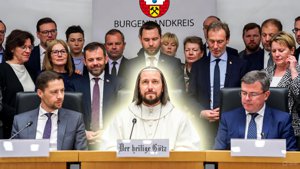



Please support THE CITIZEN'S VOICE with a donation HERE!
|
|
||
 |
||
 |
||
 |
||
| Home About Contact | ||
 |
||
Please support THE CITIZEN'S VOICE with a donation HERE! |
||
Carolin Kebekus - New Ambassador for Children's Rights?Has the former provocateur suddenly developed a heart for children? Or is there more calculation than maternal love behind her appeal for children's rights? When some think of the 44-year-old from Cologne, they recall her biting and often provocative style, which has stepped on more than a few toes. In February 2013, the heute-show aired a satirical film in which Kebekus applied to be the Popess to Cardinal Joachim Meisner. She appeared in a nun’s costume in a music video and licked a crucifix, floated above the audience at the Comedy Awards in a glittering costume, mimicked Helene Fischer, or sang praises for Karl Lauterbach. In her show “PussyTerror TV,” she frequently took aim at sexist tendencies in public, anti-feminist behavior, church-critical content, and today’s youth, often in an exaggerated manner. Last year, she made headlines because the otherwise emancipated Kebekus, who always gave the impression that children weren’t a priority in her life, was pregnant. She performed on stage with a visible baby bump, becoming a target for some women’s rights activists who tirelessly argued that performing with a baby bump was inappropriate. Kebekus often countered that emancipation meant having the choice to work or not. She enjoyed it and it didn’t burden her, so why should there be anything against it? Since the beginning of the year, things had been quiet around the conspicuous young woman until, on Sunday, a special program interrupted the “Erste Deutsche Fernsehen” (ARD) evening schedule for a full 14:39 minutes, delaying the Tatort until 8:30 p.m. But what did Kebekus have to say that was so important? She appealed for the future of our country and those who will inherit and shape it – our children. Alongside child co-stars, she highlighted that children’s rights have still not been enshrined in the German Constitution. Historical Background: On November 20, 1989, the United Nations General Assembly adopted the Convention on the Rights of the Child (CRC). This granted all children worldwide codified rights – to survival, development, protection, and participation. The rights and definition of a child are outlined in 54 articles. UN member states agreed on these rights for children and made them legally binding in their countries. This is an important message, and Kebekus has been recruited for various causes in the past. She previously advocated for vaccination with questionable Covid-19 vaccines, heavily praised Lauterbach’s measures, used gender-inclusive language in all her formats, and labeled system-critical individuals as Nazis. Is she really the right face for this important message? Hasn’t she spent years proclaiming how little she understands women who sacrifice themselves for motherhood, putting their careers and sometimes relationships on the back burner? Not long ago, she viewed so-called tradwives as victims of the alternative right. Of course, one could argue that motherhood has given her entirely new perspectives on some issues, which may well be true. Nevertheless, there’s a lingering aftertaste from past years when, like many of her public broadcasting colleagues, she parroted government-compliant messages and even leveraged her reputation and role-model status to promote them. Naturally, GEZ payers are supposed to obediently follow instructions, and if politicians aren’t convincing enough, perhaps catchy songs with fun celebrities from film and TV will do the trick. Of course, people need to be kept on track and their spirits lifted so that everyone complies nicely, though this seems to have quickly faded from many viewers’ memories. Her campaign titled “Kinder stören” (Children Disturb) received mixed reactions on social media. The majority approved of the content, and the attention it sought to garner may have sparked discussion, but criticism of Kebekus herself is fairly unanimous. Many commentators would have preferred a different spokesperson – women who have long advocated for children. Well, perhaps a Katja Riemann or Eva Padberg wouldn’t draw the same ratings, or it was simply a cost-effective choice since Kebekus is already under contract with ARD and ZDF. Either way, the main stars of the show were the children, and Kebekus skillfully set them up with well-crafted prompts. Her demands at the end of the program are a far better topic for reflection. Lest they be forgotten, here they are again: We want safe school routes! - We want equal opportunities for all! - We want our single parents not to be forgotten! - We want our rights enshrined in the Constitution! - We want fair opportunities through good education! - We don’t want to be overlooked like during the pandemic! - We want our moms and dads not to have future anxieties just because they have to care for us! - We want all children to have enough money for school trips! - We want YOU to take care of it! And to quote Kebekus: Children are important! Children are valuable! Children aren’t just part of society! We must protect them or ensure they feel seen, heard, and loved – and, damn it, they should be allowed to disturb! This would be a demand for politicians to set the course accordingly. But they evidently haven’t, or this appeal wouldn’t have been necessary. The same politicians who want to be re-elected in the upcoming state elections. Convention on the Rights of the Child, or UN Children’s Rights Convention (CRC)Article 1 - Definition of "Child" Article 1 of the Children’s Rights Convention defines a child as any human being who has not yet reached the age of 18 or has not attained majority under the laws of a country. While every child enjoys the protection of the Convention, this definition also implies that states can undermine the Convention’s protective obligations if individuals under 18 are considered adults under national law. This poses central challenges for all efforts and international negotiations aimed at combating child exploitation, such as child labor or forced marriages. Article 2 – Non-Discrimination All children’s rights apply to every child, regardless of who they are, where they live, what language they speak, what religion they follow, what they think, or how they look. Regardless of their gender, whether they have a disability, are rich or poor, or who their parents or families are, or what they believe or do. No child may be treated unfairly for any reason. Article 3 – The Best Interests of the Child When decisions are made, consideration should be given to how they affect children. All adults should do what is best for children. States must ensure that every child is protected and cared for by their parents – or, if necessary, by other persons. States must also ensure that all individuals and institutions caring for children do so to the best of their ability for their well-being. Article 4 – Realization of Children’s Rights States must do everything in their power to ensure that all children, even those temporarily residing in the state, enjoy all the rights of this Convention. Article 5 – The Role in the Family All states must enable families and communities to support their children in a way that allows them to exercise their rights to the fullest. As children grow older, they will need less guidance. Article 6 – The Right to Life, Survival & Development Every child has the right to life. All states must ensure that children survive and develop to their fullest potential. Article 7 – The Right to a Name and Nationality Children must be registered at birth and have the right to a name, a birth certificate, and a nationality. As far as possible, children should know their parents and be cared for by them. Article 8 – The Right to Identity Every child has the right to their own identity – an official record of who they are, including name, nationality, and family relationships. No one may take a child’s identity away, and if this happens, states must help the child regain it quickly. Article 9 – The Right to Maintain Family Unity Children should not be separated from their parents unless the parents fail to care for the child properly, such as when a parent harms or neglects the child. If a child lives apart from one or both parents, they have the right to regular contact with both, unless this would harm the child. Article 10 – The Right to Maintain Contact with Parents Across Borders If a child lives in a different country from their parents, states must support the child and parents in maintaining contact and enabling reunification. Article 11 – Protection from Abduction States must protect children from abduction – for example, when a child is taken or held in another country by one parent against the other parent’s will. Article 12 – Respect for Children’s Opinions Children have the right to freely express their opinions on matters that affect them. Adults should listen to children and take them seriously. Article 13 – The Right to Freedom of Expression and Information Children have the right to freely express what they think and feel – through speech, drawing, writing, or other means. However, this must not harm or offend others. Article 14 – The Right to Freedom of Thought and Religion Children may form their own thoughts, opinions, and freely choose their religion. However, the rights of others must not be violated. Parents can guide their children in exercising this right. Article 15 – The Right to Join and Form Groups Children can form or join groups or organizations and peacefully assemble with others, provided no one is harmed. Article 16 – Right to Privacy Every child has the right to privacy. The law must protect children from any attacks on their privacy, family, home, communications, and reputation. Article 17 – Right to Access Information Children have the right to obtain information from the internet, radio, television, newspapers, books, and other sources. Adults should ensure that the information does not harm children. States should encourage media to publish information from various sources in child-friendly language. Article 18 – Parental Responsibility Parents bear the primary responsibility for raising their children. If a child has no parents or cannot live with them, other adults, called “guardians,” should take on this role. All adults must ensure children’s well-being. States should support this task. If a child has both parents, both should be responsible for the child. Article 19 – Right to Protection from Violence States must protect children from all forms of violence, abuse, and neglect. Article 20 – Right to Protection for Children Without Families Every child who cannot live with their own family has the right to be appropriately cared for by others. These individuals must respect the child’s religion, culture, language, and other characteristics. Article 21 – Protection of Adopted Children When children are adopted, the best interests of the child must be prioritized. If a child cannot be properly cared for in their own country, adoption in another country is also possible. Article 22 – Rights of Refugee Children Children who flee their home country to another due to safety concerns should receive the same support, protection, and rights as children born in that state. Article 23 – Rights of Children with Disabilities Every child with a disability should be able to live the best possible life in society. States should remove all barriers for children with disabilities to enable their independence and active participation in community life. Article 24 – Right to Health, Water, Environment, and Nutrition Children have the right to the best possible healthcare, clean drinking water, healthy food, and a clean and safe environment. All adults and children should be informed about how to live safely and healthily. Article 25 – Right to Review of Placement Every child placed outside their family – for care, protection, or health reasons – has the right to regular reviews to ensure their well-being and whether the placement is the best option for them. Article 26 – Right to Social and Economic Security All states should provide financial or other support to assist children from poor families. Article 27 – Right to Food, Clothing, and a Safe Home Children have the right to food, clothing, and a safe home to develop to their fullest potential. The state should support families and children who cannot afford these necessities. Article 28 – Right to Access Education Every child has the right to education. Primary education should be free. Secondary and higher education should be available to every child. Every child should be supported to achieve the highest possible educational qualification. Schools should be free of violence and respect children’s rights. Article 29 – Right to the Best Possible Education Children’s education should help them fully develop their personalities, talents, and abilities. Education should teach them about their own rights and to respect the cultures and differences of others. It should promote peaceful coexistence and environmental protection. Article 30 – Protection of Minorities Every child has the right to live their own language, culture, and religion, even if most people in the country where the child lives have a different language, culture, or religion. Article 31 – Right to Leisure, Play, Culture, and Art Every child has the right to leisure, play, and cultural and creative activities. Article 32 – Protection from Economic Exploitation Children have the right to be protected from work that is dangerous or harms their education, health, or development. If children work, they have the right to safety and fair pay. Article 33 – Protection from Addictive Substances States must protect children from drugs and ensure they do not use, produce, transport, or sell drugs. Article 34 – Protection from Sexual Abuse States should protect children from all forms of sexual abuse and exploitation, including being forced into sex for money or being depicted in sexual images or films. Article 35 – Prevention of Child Trafficking States must ensure that children are not abducted or sold. They must also prevent children from being taken to other countries or places for exploitation or abuse. Article 36 – Protection from Exploitation Every child has the right to protection from any form of exploitation, even if not explicitly mentioned in this Convention. Article 37 – Protection of Children in Detention Children accused of breaking the law must not be killed, tortured, or treated cruelly. They must not be sentenced to life imprisonment or detained with adults. Detention should be as short as possible. Detained children must receive legal assistance and maintain contact with their families. Article 38 – Protection from Armed Conflicts Every child has the right to protection during wartime. No child under 15 may be recruited for active participation in armed conflicts or belong to an army. Article 39 – Right to Recovery and Reintegration Every child who has been injured, neglected, abused, mistreated, or affected by war has the right to assistance to restore their dignity and recover their health. Article 40 – Protection in the Criminal Justice System Every child accused of breaking the law has the right to legal assistance and fair treatment in court. States should offer numerous solutions to help delinquent children reintegrate into society successfully. Prison should always be the last resort. Article 41 – Right to the Best Law Available If a country’s laws protect children’s rights better than this Convention, those laws should apply. Article 42 – Dissemination of Children’s Rights States should actively work to educate children and adults about this Convention to ensure everyone is informed about children’s rights. Articles 43 to 52 – CONVENTION ON THE RIGHTS OF THE CHILD These articles outline how states, the United Nations – including the Committee on the Rights of the Child and UNICEF – and other organizations collaborate to ensure all children enjoy their rights. Author: AI-Translation - Carla Kolumná | 21.08.2024 |

|
| Other articles: |
 | Never again fines, never again having to follow laws – District Administrator Götz Ulrich (CDU) clears the wayMail arrived from the District Administrator’s office with a bundle of letters, which warms the heart on these gray autumn days. The beloved District Administrator of Burgenlandk... zum Artikel |
 | Paternalism by Politics! What the Released Emails of the “Mandatory Vaccination Working Group” Reveal About Our Understanding of DemocracyIt is a political disgrace that key information about government actions—especially in matters concerning fundamental rights and bodily autonomy—must first be fought for in cou... zum Artikel |
 | This Cannot Go On! - Open Declaration for Peace - Stop Billions for Arms, War, and Military Aid. For Fair Politics - For Our HomelandThomas Gens, Mayor of the Island of Hiddensee, writes an open letter to the German Bundestag and the Chancellor.... zum Artikel |
|
Support the operation of this website with voluntary contributions: via PayPal: https://www.paypal.me/evovi/12 or via bank transfer IBAN: IE55SUMU99036510275719 BIC: SUMUIE22XXX Account holder: Michael Thurm Shorts / Reels / Kurz-Clips Imprint / Disclaimer |